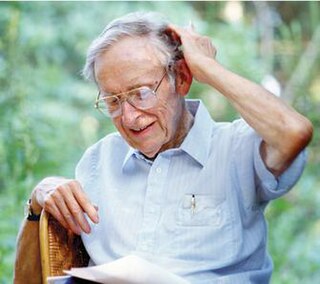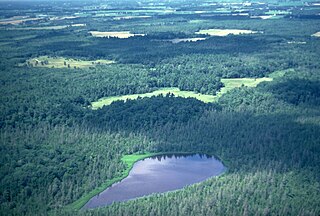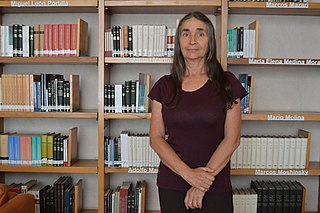Related Research Articles

Landscape ecology is the science of studying and improving relationships between ecological processes in the environment and particular ecosystems. This is done within a variety of landscape scales, development spatial patterns, and organizational levels of research and policy. Concisely, landscape ecology can be described as the science of landscape diversity as the synergetic result of biodiversity and geodiversity.

Eugene Pleasants Odum was an American biologist at the University of Georgia known for his pioneering work on ecosystem ecology. He and his brother Howard T. Odum wrote the popular ecology textbook, Fundamentals of Ecology (1953). The Odum School of Ecology is named in his honor.

Historical ecology is a research program that focuses on the interactions between humans and their environment over long-term periods of time, typically over the course of centuries. In order to carry out this work, historical ecologists synthesize long-series data collected by practitioners in diverse fields. Rather than concentrating on one specific event, historical ecology aims to study and understand this interaction across both time and space in order to gain a full understanding of its cumulative effects. Through this interplay, humans adapt to and shape the environment, continuously contributing to landscape transformation. Historical ecologists recognize that humans have had world-wide influences, impact landscape in dissimilar ways which increase or decrease species diversity, and that a holistic perspective is critical to be able to understand that system.

The Cedar Creek Ecosystem Science Reserve is an ecological research site located primarily in East Bethel, Minnesota in the counties of Anoka and Isanti on the northern edge of the Minneapolis-Saint Paul metropolitan area.
Tropical ecology is the study of the relationships between the biotic and abiotic components of the tropics, or the area of the Earth that lies between the Tropic of Cancer and the Tropic of Capricorn. The tropical climate experiences hot, humid weather and rainfall year-round. While many might associate the region solely with the rainforests, the tropics are home to a wide variety of ecosystems that boast a great wealth of biodiversity, from exotic animal species to seldom-found flora. Tropical ecology began with the work of early English naturalists and eventually saw the establishment of research stations throughout the tropics devoted to exploring and documenting these exotic landscapes. The burgeoning ecological study of the tropics has led to increased conservation education and programs devoted to the climate. This climatic zone offers numerous advantages to ecologists conducting a wide array of studies, from rich biodiversity to vast lands untainted by man.
Monica G. Turner is an American ecologist known for her work at Yellowstone National Park since the large fires of 1988. She is currently the Eugene P. Odum Professor of Ecology at the University of Wisconsin–Madison.

David Lindenmayer,, is an Australian scientist and academic. His research focuses on the adoption of nature conservation practices in agricultural production areas, developing ways to improve integration of native forest harvesting and biodiversity conservation, new approaches to enhance biodiversity conservation in plantations, and improved fire management practices in Australia. He specialises in large-scale, long-term research monitoring programs in south-eastern Australia, primarily in forests, reserves, national parks, plantations, and on farm land.
Ecosystem health is a metaphor used to describe the condition of an ecosystem. Ecosystem condition can vary as a result of fire, flooding, drought, extinctions, invasive species, climate change, mining, fishing, farming or logging, chemical spills, and a host of other reasons. There is no universally accepted benchmark for a healthy ecosystem, rather the apparent health status of an ecosystem can vary depending upon which health metrics are employed in judging it and which societal aspirations are driving the assessment. Advocates of the health metaphor argue for its simplicity as a communication tool. "Policy-makers and the public need simple, understandable concepts like health." Some critics worry that ecosystem health, a "value-laden construct", can be "passed off as science to unsuspecting policy makers and the public." However, this term is often used in portraying the state of ecosystems worldwide and in conservation and management. For example, scientific journals and the UN often use the terms planetary and ecosystem health, such as the recent journal The Lancet Planetary Health.
Aaron M. Ellison is an ecologist, photographer, sculptor, and writer. He retired in July 2021 after 20 years as the Senior Research Fellow in Ecology at Harvard University and as a Senior Ecologist at the Harvard Forest. He also served as Deputy Director of the Harvard Forest from 2018-2021. Until 2018, he also was an adjunct research professor at the University of Massachusetts in the Departments of Biology and Environmental Conservation. Ellison has both authored and co-authored numerous scientific papers, books, book reviews and software reviews. For more than 30 years, Ellison has studied food-web dynamics and community ecology of wetlands and forests; the evolutionary ecology of carnivorous plants; the responses of plants and ants to global climate change; application of Bayesian statistical inference to ecological research and environmental decision-making; and the critical reaction of Ecology to Modernism. In 2012 he was elected a fellow of the Ecological Society of America. He was the editor-in-chief of Ecological Monographs from 2008 to 2015, was a senior editor of Methods in Ecology and Evolution from 2018-2021, and since 2021 has been the executive editor of Methods in Ecology and Evolution.

Judith (Judy) H. Myers is a Canadian-American ecologist. In 2014 she was elected president of the Canadian Society for Ecology and Evolution. Professor Myers is well known for her decades-long research into plant-animal-microbe interactions, including insect pest outbreaks, viral pathogens of insects, and pioneering work on biological control of insects and plants, particularly invasive species. Throughout her career she has advocated strongly for both the public understanding of science and for increasing the number of women in the STEM subjects: Science, Technology, Engineering, and Mathematics.

Kathy Martin is a global authority on arctic and alpine grouse and ptarmigan, and on tree cavity-nesting vertebrates. She is a professor in the Faculty of Forestry at the University of British Columbia and a senior research scientist with Environment and Climate Change Canada.

Marie-Josée Fortin is an ecologist and Professor in the Department of Ecology and Evolutionary Biology at the University of Toronto. Fortin holds the Tier 1 Canada Research Chair in Spatial Ecology at the University of Toronto. In 2016, she was elected as a Fellow of the Royal Society of Canada.

Julia Carabias Lillo is a Mexican ecologist and Environmental Conservationist. She is a Professor at the National Autonomous University of Mexico and served as the Secretariat of Environment and Natural Resources under President Ernesto Zedillo from 1994 to 2000.
Emily Stanley is an American professor of limnology at the University of Wisconsin–Madison. She was named a 2018 Ecological Society of America Fellow and her research focuses on the ecology of freshwater ecosystems.
James Peter (Hamish) Kimmins was born in 1942 in Jerusalem, Israel and died 2021 on Denman Island, BC. He earned his B.Sc. in Forestry at the University of Wales Bangor (1964), M.Sc. in Forest Entomology at the University of California at Berkeley (1966), M.Phil. (1968) and Ph.D. in Forest Ecology with honours at Yale University (1970). In 1969, he began at the Faculty of Forestry, University of British Columbia (UBC). where he served in various capacities and retired on December 31, 2007 as Professor of Forest Ecology. In 2007, he received the title of Professor Emeritus at UBC.

Ivette Perfecto is an ecologist and professor at the University of Michigan. Her work focuses on complex ecosystem dynamics and the application of ecological theories to agricultural systems.
Kimberly A. With is an American ecologist. She is a Full Professor in the Division of Biology at Kansas State University.
Claire Ozanne is an insect ecologist in the UK, she is Professor of Ecology and Deputy Director and Provost at SOAS.

Shahid Naeem is an ecologist and conservation biologist and is a Lenfest Distinguished professor and chair in the Department of Ecology, Evolution, and Environmental Biology at Columbia University. Naeem is the author of Biodiversity, Ecosystem Functioning, and Human Well-Being, and has published over 100 scientific articles.
Robin Lee Chazdon is an American tropical ecologist. She is a professor emeritus of ecology and evolutionary biology in the College of Liberal Arts and Sciences at the University of Connecticut.
References
- ↑ "Department of Forest and Conservation Sciences". University of British Columbia. Retrieved March 4, 2019.
- ↑ Gergel SE, Turner MG, Miller JR, Melack JM, Stanley EH (2002). "Landscape indicators of human impacts to riverine systems". Aquat. Sci. 64 (118): 28. doi:10.1007/s00027-002-8060-2. S2CID 18090128.
- ↑ "Research in Spatial Ecology UF Wildlife Ecology and Conservation". Retrieved February 21, 2019.
- ↑ "Faculty Profile" . Retrieved March 21, 2021.
- ↑ Tomscha, S. A.; S. E. Gergel (2016). "Ecosystem service trade-offs and synergies misunderstood without landscape history". Ecology and Society. 21 (1): 43. doi: 10.5751/ES-08345-210143 .
- ↑ Eddy, I.M.; Gergel, S.E.; Coops, N.C.; Henebry, G.M.; Levine, J.; Zerriffi, H.; Shibkov, E. (2017). "Integrating remote sensing and local ecological knowledge to monitor rangeland dynamics". Ecological Indicators. 82: 106–116. doi:10.1016/j.ecolind.2017.06.033.
- ↑ "On the edge of forests, change comes in many forms". Forests News, Center for International Forestry Research (blog). 16 August 2017.
- ↑ Gergel, S.; Turner, M.G, eds. (2012). Learning Landscape Ecology: A Practical Guide to Concepts and Techniques. New York: Springer. ISBN 978-1-4939-6372-0.
- ↑ Gergel, S.; Turner, M.G., eds. (2017). Learning Landscape Ecology: A Practical Guide to Concepts and Techniques (2nd ed.). New York: pringer. ISBN 978-1-4939-6372-0.
- ↑ Ellis, E. (2018). "Learning Landscape Ecology: A Practical Guide to Concepts and Techniques". Quarterly Review of Biology. 93 (2): 42.
- ↑ "AAAS Honors Accomplished Scientists as 2018 Elected Fellows". AAAS. Retrieved March 5, 2019.